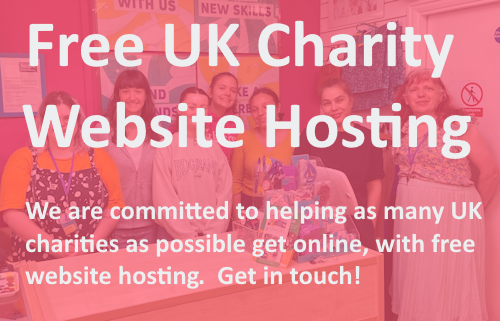Free website hosting for UK charities
We have our own website hosting servers and offer this as a service to our customers whether we design you a website or not. It's our view that UK websites really ought to be hosted in the UK to ensure they are compliant with our strict data protection regulations. We are committed to getting as many UK-based charities as possible online, with free website hosting.
Just as with all businesses, having a website offers numerous benefits to a charity, enhancing its ability to fulfill its mission and engage with stakeholders. Here are some of the key advantages of having a website, so get in touch using any method you choose if you would like some help to get started:
Increased Visibility and Reach
-
Global Audience: A website allows a charity to reach a broader audience, both locally and globally. This visibility can attract new donors, volunteers, and supporters who may not have known about the charity otherwise.
- 24/7 Accessibility: Unlike physical offices or events, a website is accessible 24/7, allowing people to learn about the charity, donate, or get involved at any time.
Enhanced Credibility and Trust
-
Professional Image: A well-designed website provides a professional appearance, which can help build credibility and trust with potential donors and partners. It serves as a platform to showcase the charity’s work, mission, and impact.
- Transparency: Through the website, a charity can share financial reports, success stories, and updates, which enhances transparency and builds trust with its audience.
Efficient Fundraising
-
Online Donations: A website can facilitate online donations, making it easier for supporters to contribute. Integrating donation platforms allows for secure, convenient transactions, potentially increasing fundraising revenue.
- Crowdfunding and Campaigns: The charity can run targeted fundraising campaigns directly through its website, enabling it to reach specific goals and engage donors with ongoing initiatives.
Improved Communication and Engagement
-
Regular Updates: The charity can use the website to post news, updates, and blogs, keeping supporters informed about recent activities and future plans.
- Social Media Integration: A website can integrate with social media platforms, making it easier to share content and drive engagement across multiple channels.
Volunteer Recruitment and Coordination
-
Volunteer Sign-Ups: A website can include forms and information for volunteers, simplifying the recruitment process. It can also provide resources and updates specifically for volunteers.
- Event Management: The charity can use the website to manage events, including registration, scheduling, and updates, making it easier to organize and promote activities.
Educational Resource
-
Awareness and Advocacy: The website can serve as an educational resource, raising awareness about the charity’s cause and advocating for change. It can host articles, videos, and infographics to inform the public.
- Resource Hub: The charity can provide downloadable resources, toolkits, or guides on the website, furthering its educational mission.
Data Collection and Insights
-
Analytics: Through tools like Google Analytics, a charity can gather data on website visitors, helping to understand the demographics and behaviors of its audience. This data can inform marketing strategies and improve outreach efforts.
- Email List Building: The website can encourage visitors to sign up for newsletters, building a valuable email list for future campaigns and communications.
Cost-Effective Marketing
-
SEO and Content Marketing: By optimizing the website for search engines, the charity can attract organic traffic without the need for expensive advertising. Content marketing, such as blogs or success stories, can further enhance visibility.
- Reduced Printing Costs: Information that would traditionally require printed materials can be distributed online, reducing costs and environmental impact.
Centralized Information Hub
-
One-Stop Information Source: A website serves as a central location where all important information about the charity is available, including its mission, history, programs, and how to get involved. This centralization makes it easier for stakeholders to find what they need.
Flexibility and Scalability
-
Easy Updates: Unlike printed materials, a website can be updated quickly to reflect new programs, events, or changes in the organization. This flexibility ensures that information is always current.
- Scalable Growth: As the charity grows, the website can evolve, adding new features like member portals, forums, or e-commerce options to support merchandise sales or other revenue streams.
In summary, a website is a powerful tool for a charity, enhancing its ability to raise funds, engage supporters, and fulfill its mission more effectively and efficiently. Get in touch using any method you choose for some help to get started.
